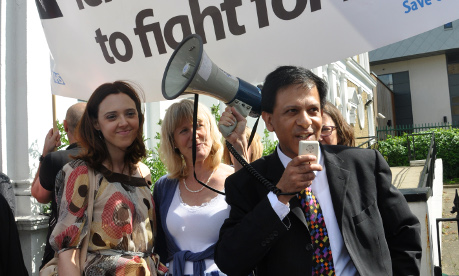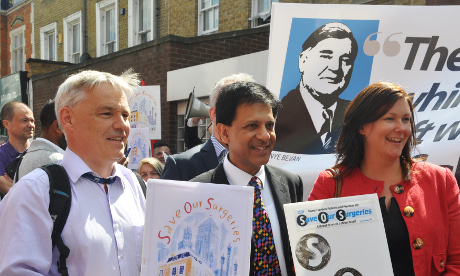Hackney GPs ‘gobsmacked’ by Government’s defence of NHS cuts which may close 12 surgeries

Save Our Surgeries: Jubilee Street practice manager Virginia Patania, Dr Naomi Beer and Dr Chaand Nagpaul, BMA Chairman, at the protest march last week. Photograph: Dr Sally Hull
A government minister’s comments, which attacked calls against NHS cuts in a parliamentary debate on Tuesday, have attracted stern criticism from GPs in and around Hackney.
In a parliamentary debate on Tuesday, Health Minister Daniel Poulter claimed the new model should prioritise services according to “head of population”.
This means that relatively wealthy areas with a healthy population receive the same healthcare funding as poorer areas that have far worse health predicaments.
12 Hackney GP surgeries face closure and GPs fear that hundreds of thousands of East Londoners face being left with inadequate services as the surgeries that do survive will be pushed to breaking point.
Virginia Patania, a leading campaigner for NHS services in East London, described Mr Poulter’s comments as “unbelievable” while Dr Jonathon Tomlinson, a Hackney GP, said: “I have very little faith in the government.”
Mr Poulter said: “If you have a payment system that is 20 years out of date historically, that is not funding patients according to clinical need, or is not per head of population, then that’s not going to deliver good care.
“The payment system needs to be changed. NHS England is working with practices that are facing any challenges to make sure those challenges are going to be addressed and high quality patient care can still be delivered locally.”
While both Ms Patania and Dr Tomlinson believe the current system is “out of date”, they maintain that payments should compensate for deprived areas, reflecting “clinical need” rather than size of population.
Funding Crisis
Under the government’s plans, spearheaded by Health Secretary Jeremy Hunt, the Minimum Practice Income Guarantee (MPIG) is set to be phased out within seven years.
Since 2004, the MPIG has compensated practices in high poverty areas since care costs are generally higher there due to the link between poverty and ill health.
Ms Patania, Practice Manager of the Jubilee Street Practice in Tower Hamlets, told the Hackney Citizen: “Even with the MPIG, it was difficult for us to survive, but without it, our practice will be totally financially unviable.”
She added: “The payment system must take deprivation into account – not all practices are alike.”
Mr Tomlinson, GP at the Lawson Practice in Hackney, said: “Patient demand is much higher in poor areas than rich ones. There are 6.4 appointments per head at our practice while the national average is 4.
“Some kind of deprivation payment is needed to reflect the considerable workload in areas with particularly high levels of poverty, poor housing and social inequality.”
He added that by the end of the seven years when the MPIG is phased out, the practice will have lost £200,000 per year. This amounts to more than 300 face-to-face appointments every week.
Both healthcare professionals pointed out the link between poor mental health and poverty, plus the high rates of co morbidity in poor areas – the presence of one or more illnesses in a patient.
Changes ‘Unfair’
Earlier, MP for Hackney South and Shoreditch, Meg Hillier had challenged the government’s position, claiming the changes were “unfair”.
Ms Hillier said: “Earlier the Secretary of State and his Minister said that the MPIG was unfair. What is unfair is that so many practices in Hackney and in East London are set to close in an area with great deprivation.”
“What’s he going to do to make sure that patients will still have practices to go to?”, she asked.
Across the UK, it is estimated that 98 GP surgeries are in danger of closing, with 35 in London, of which 22 are in East London.
NHS England previously said: “As a result of these changes, the majority of GP practices in London will receive more funding in their global sum, however, a small number of practices will lose funding.”
Protest March
The ongoing debate over the coalition government’s handling of the NHS follows a protest march on 5 June where over 500 people campaigned to save surgeries across Hackney, Newham and Tower Hamlets.
Ms Patania, who spoke at the march, said: “The day went extremely well. We built really good momentum during the day explaining our cause to locals.”
The “Save Our Surgeries” march was also attended by Dr Chaand Nagpaul, Chair of the British Medical Association General Practice Committee, a well known figure throughout the NHS.

